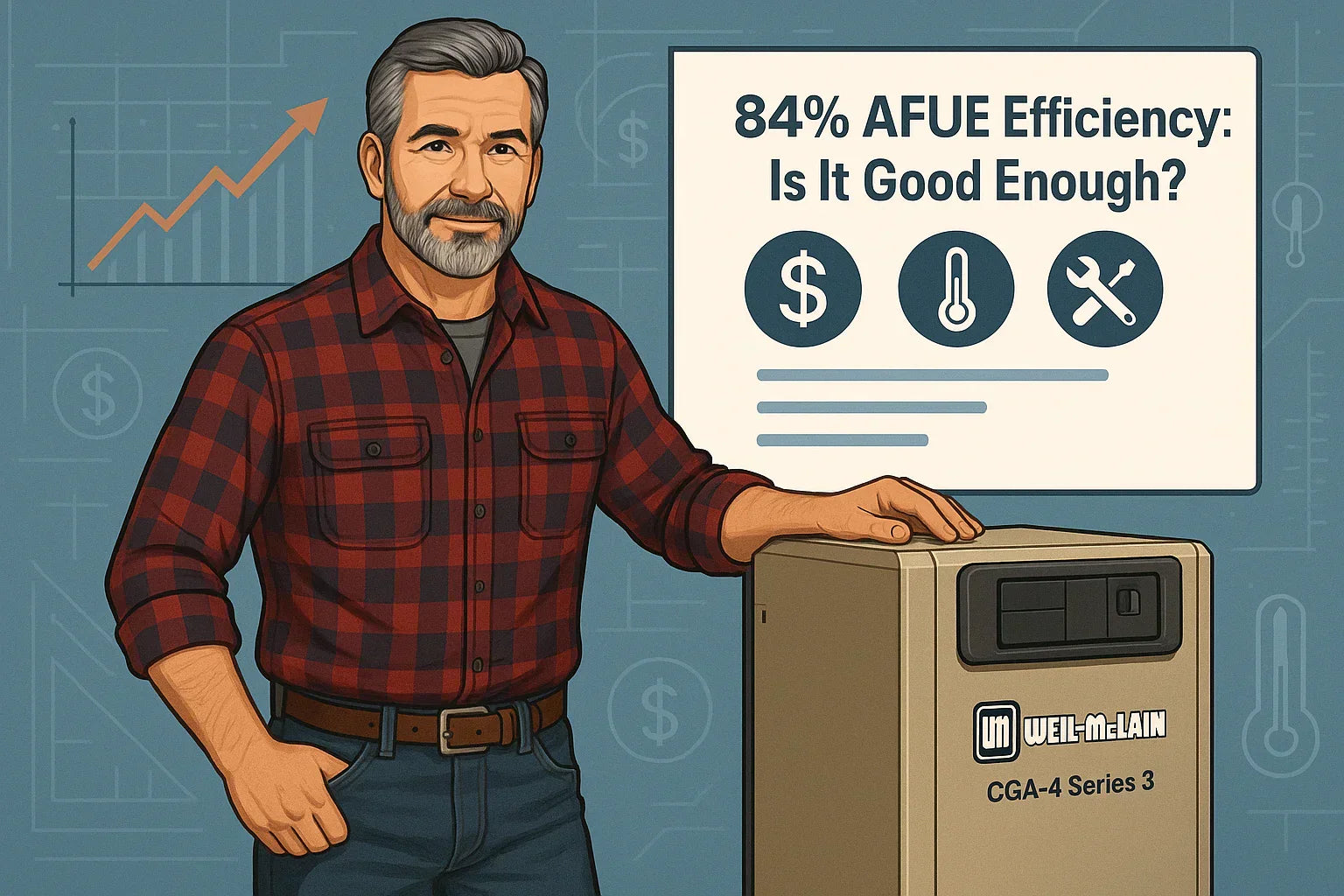For homeowners like Mike Sanders—practical, ROI-minded, and skeptical of overhyped tech—boiler efficiency isn’t about hitting the highest number on the box. It’s about what works long-term. So when you see a rating like 84% AFUE on a cast iron unit like the Weil-McLain CGA-4, the question becomes: is that efficient enough for 2025, or is it already outdated?
This guide explains AFUE in plain language, compares it across boiler types, and helps you decide if 84% hits the sweet spot or if you need to look higher.
📏 1. What Does AFUE Actually Mean?
AFUE = Annual Fuel Utilization Efficiency
-
Measures how efficiently a boiler converts fuel into usable heat over a heating season.
-
An 84% AFUE boiler converts 84 cents of every fuel dollar into heat, while the remaining 16 cents are lost via the chimney or flue.
🔥 2. 84% AFUE in the Real World: Mike’s Cost Example
Let’s say Mike spends $1,500/year on natural gas for heating.
-
At 84% AFUE → $1,260 is used as heat, $240 is lost.
-
At 95% AFUE → $1,425 is used as heat, $75 is lost.
Annual difference: ~$165 10-year difference: ~$1,650 (before factoring maintenance or upfront cost)
➡️ Key insight: Higher efficiency saves money slowly.
🧱 3. Cast Iron Boilers Like the CGA-4: Why 84% Isn’t a Red Flag
✅ Why It’s "Efficient Enough" for Many Homes
-
High thermal mass: Cast iron retains heat longer
-
Stable performance: Efficiency doesn’t degrade quickly with age
-
Lower maintenance: Fewer moving parts, fewer sensor failures
🔧 Designed for Traditional Systems
-
Works perfectly with baseboard and radiator heating
-
Doesn’t require PVC venting or drain lines
🧪 4. AFUE vs. Real-World Efficiency
| Factor | AFUE Rating Covers? | Real Impact? |
|---|---|---|
| Short cycling | ❌ | Yes – lowers true efficiency |
| System zoning | ❌ | Yes – unused zones reduce load |
| Poor insulation | ❌ | Yes – heat loss increases cost |
| Fuel type fluctuations | ❌ | Yes – gas/oil prices vary |
➡️ Mike’s takeaway: AFUE is lab-tested—not real-world tested.
⚖️ 5. 84% vs. 90–95% AFUE: Is It Worth the Upgrade?
High-Efficiency Condensing Boiler (90–95%)
-
Pros:
-
Up to 30% more efficient
-
Qualifies for larger rebates
-
Quieter operation
-
-
Cons:
-
Higher initial cost ($1,500–$3,000 more)
-
Shorter lifespan (15–20 years)
-
Requires annual maintenance and water quality monitoring
-
Standard Cast Iron (84%)
-
Pros:
-
Proven lifespan (25–35 years)
-
Lower maintenance
-
Lower install cost
-
-
Cons:
-
Doesn’t qualify for federal high-efficiency tax credit
-
Larger physical footprint
-
🧾 6. Fuel Costs by Region: Does It Matter Where You Live?
| Region | Avg Gas Cost (2025 est.) | High-Efficiency Payoff? |
| Northeast | $1.60/therm | Yes (long winters) |
| Midwest | $1.35/therm | Maybe |
| South | $1.25/therm | No (short heating season) |
| West Coast | $1.50/therm | Yes (if cold climate zone) |
➡️ Colder the climate, faster the payback on 90%+ units.
🧠 7. Mike’s Decision Flow: Should You Stick with 84%?
-
Live in a cold climate with long winters?
-
Go high-efficiency if you’re okay with annual maintenance.
-
-
Already have radiators or baseboard heat?
-
Stick with cast iron – 84% is stable and designed for this.
-
-
Plan to stay in the home for 15+ years?
-
Consider ROI based on lifespan, not just savings per year.
-
-
Want fewer repairs and service calls?
-
Cast iron wins on simplicity and ruggedness.
-
✅ Conclusion: Is 84% Good Enough?
For Mike Sanders—and homeowners like him—the answer is often yes.
The Weil-McLain CGA-4’s 84% AFUE rating represents a balance of reliability, longevity, and efficiency. While it’s not the highest on the market, it performs consistently in older homes and traditional radiator setups. And over 25–30 years, that stability often outweighs the small annual savings from chasing a higher AFUE number.
In the next topic we will know more about: Natural Gas vs. Propane Boilers: What’s Best for Your Region and Budget?







